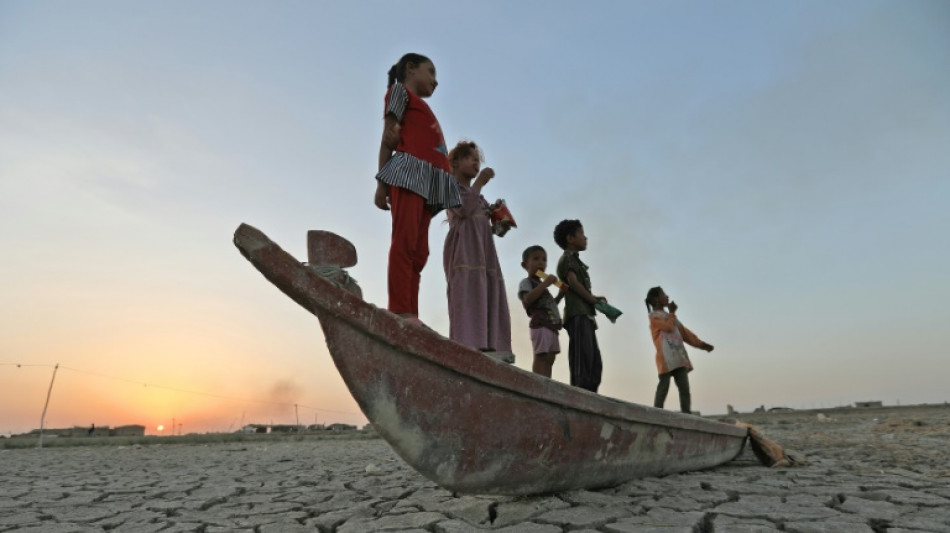
-
 Captain's injury agony mars 'emotional' Italy debut at T20 World Cup
Captain's injury agony mars 'emotional' Italy debut at T20 World Cup
-
Family matters: Thaksin's party down, maybe not out

-
 African players in Europe: Ouattara fires another winner for Bees
African players in Europe: Ouattara fires another winner for Bees
-
Pressure grows on UK's Starmer over Epstein fallout

-
 Music world mourns Ghana's Ebo Taylor, founding father of highlife
Music world mourns Ghana's Ebo Taylor, founding father of highlife
-
HK mogul's ex-workers 'broke down in tears' as they watched sentencing

-
 JD Vance set for Armenia, Azerbaijan trip
JD Vance set for Armenia, Azerbaijan trip
-
Sydney police deploy pepper spray as Israeli president's visit sparks protests

-
 EU warns Meta it must open up WhatsApp to rival AI chatbots
EU warns Meta it must open up WhatsApp to rival AI chatbots
-
Scotland spoil Italy's T20 World Cup debut with big win

-
 Israeli president says 'we will overcome evil' at Bondi Beach
Israeli president says 'we will overcome evil' at Bondi Beach
-
Munsey leads Scotland to 207-4 against Italy at T20 World Cup

-
 Japan restarts world's biggest nuclear plant again
Japan restarts world's biggest nuclear plant again
-
Bangladesh poll rivals rally on final day of campaign

-
 Third impeachment case filed against Philippine VP Duterte
Third impeachment case filed against Philippine VP Duterte
-
Wallaby winger Nawaqanitawase heads to Japan

-
 Thailand's Anutin rides wave of nationalism to election victory
Thailand's Anutin rides wave of nationalism to election victory
-
Venezuela's Machado says ally kidnapped by armed men after his release

-
 Maye longs for do-over as record Super Bowl bid ends in misery
Maye longs for do-over as record Super Bowl bid ends in misery
-
Seahawks' Walker rushes to Super Bowl MVP honors

-
 Darnold basks in 'special journey' to Super Bowl glory
Darnold basks in 'special journey' to Super Bowl glory
-
Japan's Takaichi may struggle to soothe voters and markets

-
 Seahawks soar to Super Bowl win over Patriots
Seahawks soar to Super Bowl win over Patriots
-
'Want to go home': Indonesian crew abandoned off Africa demand wages

-
 Asian stocks track Wall St rally as Tokyo hits record on Takaichi win
Asian stocks track Wall St rally as Tokyo hits record on Takaichi win
-
Bad Bunny celebrates Puerto Rico in joyous Super Bowl halftime show

-
 Three prominent opposition figures released in Venezuela
Three prominent opposition figures released in Venezuela
-
Israeli president says 'we shall overcome this evil' at Bondi Beach

-
 'Flood' of disinformation ahead of Bangladesh election
'Flood' of disinformation ahead of Bangladesh election
-
Arguments to begin in key US social media addiction trial

-
 Who is the Best Facelift Surgeon in Florida?
Who is the Best Facelift Surgeon in Florida?
-
FireFox Gold Expands the Northeast Zone, including 54.91 g/t Gold over 1.95 Metres in 95 Metre Step-out at Mustajärvi Gold Project, Finland

-
 Dr. Jonathan Spages Expands Diabetes Reversal Practice Across New States, Adds Clinical Team to Meet Growing Demand
Dr. Jonathan Spages Expands Diabetes Reversal Practice Across New States, Adds Clinical Team to Meet Growing Demand
-
Agronomics Limited Announces Net Asset Value Calculation as at 31 December 2025

-
 UK-Based Vesalic Limited Emerges from Stealth with Landmark Discovery of Potential Non-CNS Driver of Motor Neuron Diseases, including ALS, and Breakthrough Therapeutic and Diagnostic Opportunities
UK-Based Vesalic Limited Emerges from Stealth with Landmark Discovery of Potential Non-CNS Driver of Motor Neuron Diseases, including ALS, and Breakthrough Therapeutic and Diagnostic Opportunities
-
Gotterup tops Matsuyama in playoff to win Phoenix Open

-
 New Zealand's Christchurch mosque killer appeals conviction
New Zealand's Christchurch mosque killer appeals conviction
-
Leonard's 41 leads Clippers over T-Wolves, Knicks cruise

-
 Trump says China's Xi to visit US 'toward the end of the year'
Trump says China's Xi to visit US 'toward the end of the year'
-
Real Madrid edge Valencia to stay on Barca's tail, Atletico slump

-
 Malinin keeps USA golden in Olympic figure skating team event
Malinin keeps USA golden in Olympic figure skating team event
-
Lebanon building collapse toll rises to 9: civil defence

-
 Real Madrid keep pressure on Barca with tight win at Valencia
Real Madrid keep pressure on Barca with tight win at Valencia
-
PSG trounce Marseille to move back top of Ligue 1

-
 Hong Kong to sentence media mogul Jimmy Lai in national security trial
Hong Kong to sentence media mogul Jimmy Lai in national security trial
-
Lillard will try to match record with third NBA 3-Point title

-
 Vonn breaks leg as crashes out in brutal end to Olympic dream
Vonn breaks leg as crashes out in brutal end to Olympic dream
-
Malinin enters the fray as Japan lead USA in Olympics team skating

-
 Thailand's Anutin readies for coalition talks after election win
Thailand's Anutin readies for coalition talks after election win
-
Fans arrive for Patriots-Seahawks Super Bowl as politics swirl


Iraq's Garden of Eden now 'like a desert'
To feed and cool his buffaloes, Hashem Gassed must cross 10 kilometres (six miles) of sunburnt land in southern Iraq, where drought is devastating swathes of the mythical Mesopotamian Marshes.
The reputed home of the biblical Garden of Eden, Iraq's swamplands have been battered by three years of drought and low rainfall, as well as reduced water flows along rivers and tributaries originating in neighbouring Turkey and Iran.
Vast expanses of the once lush Huwaizah Marshes, straddling the border with Iran, have been baked dry, their vegetation yellowing. Stretches of the Chibayish Marshes, which are popular with tourists, are suffering the same fate.
"The marshes are our livelihood -- we used to fish here and our livestock could graze and drink," said Gassed, 35, from a hamlet near Huwaizah.
Southern Iraq's marshlands were inscribed as a UNESCO World Heritage site in 2016, both for their biodiversity and their ancient history.
But now, beds of dry streams snake around the once verdant wetlands, and the area's Um al-Naaj lake has been reduced to puddles of muddy water among largely dry ground.
Like his father before him, Gassed raises buffaloes, but only five of the family's around 30 animals are left.
The others died or were sold as the family struggles to make ends meet.
Family members watch carefully over those that remain, fearful that the weak, underfed beasts might fall in the mud and die.
"We have been protesting for more than two years and no one is listening," Gassed said.
"We are at a loss where to go. Our lives are over."
- 'No more fish' -
Nestled between the Tigris and Euphrates rivers, the Mesopotamian Marshes suffered under the former dictator Saddam Hussein, who ordered that they be drained in 1991 as punishment for communities protecting insurgents, and to hunt them down.
The wetlands have sporadically gone through years of harsh drought in the past, before being revived by good rainy seasons.
But between August 2020 and this month, 46 percent of the swamplands of southern Iraq, including Huwaizah and Chibayish, suffered total surface water loss, according to Dutch peace-building organisation PAX.
Another 41 percent of marsh areas suffered from reduced water levels and wetness, according to the organisation, which used satellite data to make the assessment.
The UN's Food and Agriculture Organization in Iraq said the marshes were "one of the poorest regions in Iraq and one of the most affected by the climate change", warning of "unprecedented low water levels".
It noted the "disastrous impact" on more than 6,000 families who "are losing their buffaloes, their unique living asset".
Biodiversity is also at risk.
The swamplands provide a home for "numerous populations of threatened species", and are an important stopping point for around 200 species of migratory water birds, according to UNESCO.
Environmental activist Ahmed Saleh Neema said there were "no more fish", wild boar or even a subspecies of smooth-coated otter in the marshes.
- 'Like a desert' -
He said the Huwaizah swamplands were irrigated by two tributaries of the Tigris River, which originates in Turkey, but that their flows had dropped.
Iraqi authorities are rationing supplies to cover different needs, he said.
"The government wants to preserve the largest quantity of water possible," he added, lamenting "unfair water sharing" and "poor (resource) management".
After pressure from protesters, authorities partially opened the valves, he said, but had closed them again.
On the Iranian side, the Huwaizah Marshes, called Hoor al-Azim, are also suffering.
"The wetland is facing water stress and currently about half of its Iranian part has dried up," Iran's state news agency IRNA reported recently.
Hatem Hamid, who heads the Iraqi government's water management centre, said that "on the Iranian side, the main river that feeds the Huwaizah marsh has been totally cut for more than a year".
The water needs of Iraqi farms and marshlands are only half met, he acknowledged, as authorities are closely monitoring reserves and trying to cover a range of uses, with drinking water one of the "priorities".
Iraqi officials point to canals and small streams that have been rehabilitated to feed into the marshes -- and to where some families have relocated from dried-out areas.
But it is "impossible to compensate for the very high evaporation in the marshes" in temperatures that pass 50 degrees Celsius (122 degrees Fahrenheit), he added.
In Chibayish, the effects of the drought are all too clear to Ali Jawad, who said dozens of families had left his hamlet.
"They migrated towards other regions, looking for areas where there is water," the 20-year-old said.
"Before, when we used to come to the marshes, there was greenery, water, inner peace," he added.
"Now it's like a desert."
Y.Kobayashi--AMWN
